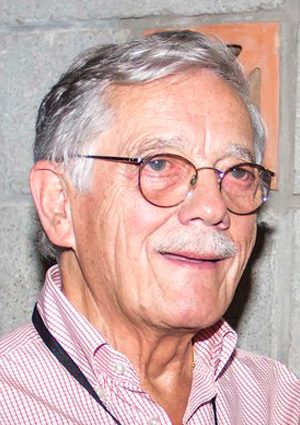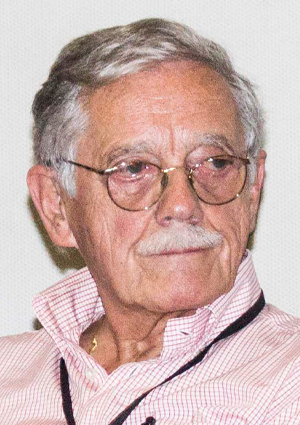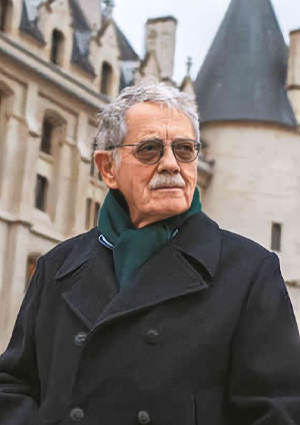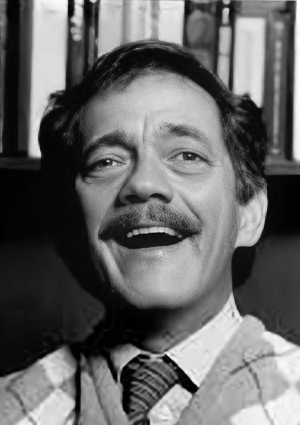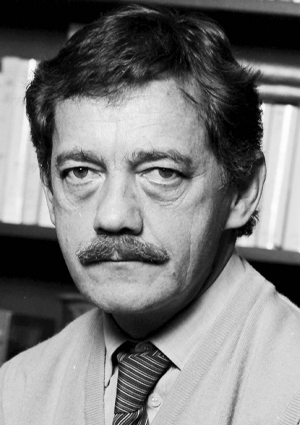Director, Screenplay, Edition, Producer
Francisco Norden
He was born to an Austrian father and a Colombian mother in Brussels (Belgium) in November 1929. Norden was the first Colombian filmmaker to participate in the Cannes Film Festival competitions with the short film Las murallas de Cartagena (The walls of Cartagena) in 1964. He would return to the festival three more times. His best-known feature film is Cóndores no entierran todos los días (Condors are not buried every day, 1984). This iconic production about the violence of the 1950s in Colombia participated in Cannes and received awards at festivals such as Biarritz, Chicago, Huelva, Havana, the Bogotá Biennial, and Figueira da Foz, among others.
Norden went to elementary school in Bogota and graduated from Colegio Mayor del Rosario high school in 1948. He began studying architecture at the Universidad Nacional de Colombia and later graduated from the École Nationale des Beaux-Arts in Paris and the Polytechnic School of Architecture in London. In 1955, he moved back to Colombia to work as a film and theater critic in press media such as El Mercurio, La Calle, Mito, and El Tiempo. In 1958, Norden returned to Europe to study at the Institut des Hautes Etudes Cinématographiques in Paris (IDHEC).
Back in Colombia, at the end of the 1960s, he worked as an advertising film director at Ellaby and made institutional and auteur short films. In 1963 he shot his first short film Las murallas de Cartagena, sponsored by Daniel Lemaitre. Later came La tierra del hombre, surcos (The land of man, furrows, 1965), produced by the Colombian Institute of Agrarian Reform; Los balcones de Cartagena (The balconies of Cartagena, 1966), sponsored by the Banco Cafetero and winner of the Grand Prize at the Campiones Film Festival (Italy); La leyenda de El Dorado (The legend of El Dorado, 1968), funded by the Gold Museum of Banco de la República. With this production, he returned to the short film competition at the Cannes Film Festival.
His work also includes the documentary short films La ruta de los libertadores (The route of the liberators, 1969) and Ayacucho (1973), both supported by the Empresa Nacional de Telecomunicaciones (Telecom); Sierra de La Macarena (Macarena Mountain Range, 1976); Arte Tayrona (Tayrona Art, 1977), also selected for the Cannes Festival; Fósiles de Villa de Leyva (Fossils of Villa de Leyva, 1978); and Ciudad perdida (Lost city, 1979).
Norden also directed the feature documentaries Camilo, el cura guerrillero (Camilo, the guerrilla priest, 1974), a journalistic analysis with testimonies about the priest's childhood before he joined the guerrilla; Se llamaría Colombia (It would be called Colombia, 1975), winner of the Silver Pyrenees Award at the VI International Festival of Tarbes Pyrenées (France); I Villagi (Villages, 1975), produced by Italian television as part of a series of six episodes shot in several continents about the Shuar Federation (Los Jívaros) in the Morona Santiago province in the Ecuadorian jungle; and Ceremonias (Ceremonies, 1975).
He also made the medium-length films El congreso mundial de brujería (Witchcraft World Congress, 1975), Cerro Matoso (1980), and El último rostro / Hoy conocí a Bolívar (The last face / Today I met Bolivar, 1981), sponsored by Bavaria and based on the story by writer Álvaro Mutis.
In 1984 he premiered Cóndores no entierran todos los días, a feature film based on the novel of the same name by Gustavo Álvarez Gardeazábal. The film was part of the Un Certain Regard section of the Cannes Festival and received the Best First Film award at the Biarritz Festival; the Critics' Prize at the Huelva Festival; and Best Actor at the Chicago Festival, among others.
In Paris, he shot the short film Paris es lindo (Paris is lovely, 1987), as well as two films for French television. The first was a series on nomadic cultures (1989), filmed on several continents, and the second was La ruta del Libertador (1992), based on testimonies of people from Bolivarian countries. In 2005 he made his second fiction film El trato, based on a mockumentary about drug trafficking in Colombia made up by British television.
In 2022, he was awarded the Macondo Award of Honor by the Colombian Academy of Cinematographic Arts and Sciences (ACACC) for a lifetime dedicated to cinema.
Filming
Director
THE DEAL (2006)
Director
PARIS ES LINDO (1987)
Director
Director
CIUDAD PERDIDA (1979)
Director
FOSILES DE VILLA DE LEIVA (1979)
Director
CEREMONIAS (1975)
Director
Director
CAMILO, EL CURA GUERRILLERO (1974)
Director
AYACUCHO (1973)
Director
Screenplay
Screenplay
CAMILO, EL CURA GUERRILLERO (1974)
Edition
Edition
CAMILO, EL CURA GUERRILLERO (1974)
Producer

